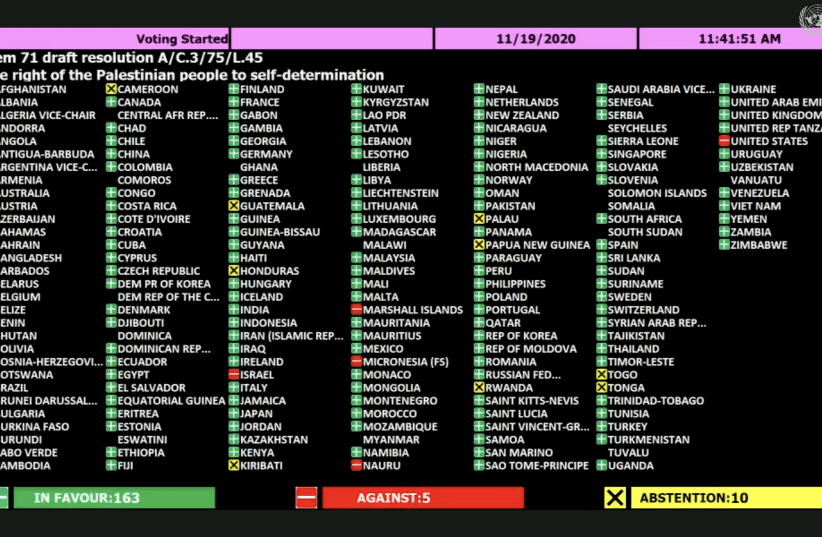Canadian Foreign Minister Chrystia Freeland has hinted that Canada had changed its historic voting pattern of opposition at the UN to support of a pro-Palestinian resolution as a statement about human rights and populism.
She spoke in response to Canadian parliamentarian Michael Chong, who pressed her on the matter during a question and answer session in the House of Commons.
“Let me speak to Canada’s place in the world and to our foreign policy. We are living in a world today where there is a worrying rise of authoritarian regimes, a worrying rise of anti-democratic populism – and our country in that world will always stand up for human rights and will always stand up for the rules-based international order,” Freeland said. “That may not always be popular but that is the Canadian way.”She spoke after Canada voted in favor of a draft United Nations General Assembly resolution in support of Palestinian self-determination for the second year in a row.
The resolution, one of close to 20 that the General Assembly will approve this year, is voted on annually. The UNGA’s Third Committee approved it Thursday with a 163-5 vote and 10 abstentions.
Israel, Marshall Islands, Micronesia, Nauru and the United States voted against it.
The countries that abstained were Australia, Cameroon, Guatemala, Honduras, Kiribati, Palau, Papua New Guinea, Rwanda, Togo and Tonga.
Canada often votes against such annual resolutions or abstains, as a protest against UN bias against Israel. More UN resolutions are passed against Israel than against any other country. Nations that oppose the pro-Palestinian and/or anti-Israel resolutions, often do so as a protest vote against bias rather than direct opposition to the texts themselves.
This particular resolution on self-determination is among the most simple of them and often garners the most support.
Canada had traditionally opposed the resolution, but last year changed its vote from “no” to “yes,” after the US recognized settlement activity as legitimate.
At the time, there was speculation that the Trudeau government’s 2019 vote of “yes,” was a one-time unique event, and an attempt to secure votes to become a UN Security Council member. Despite that vote, it did not secure a place on the UNSC.
This year, however, Canada held to that position and once again voted “yes,” a move that appeared to show that its vote last year was not a protest move.
In Canada’s House of Commons, Freeland assured Canadian Jews that her government strongly supported the Jewish state.
“Israel is a close and important friend of Canada, and Canada will always stand with Israel. Let me be very clear to Jewish Canadians: We stand with you particularly today when we are seeing an appalling rise in antisemitism here and around the world,” Freeland said.
Canada’s Ambassador to the UN Bob Rae told the UNGA that his country was a strong ally of Israel, but was also committed to the creation of a Palestinian state.
“Canada’s vote today is a reflection of our longstanding commitment to the right of self-determination for both Israelis and Palestinians,” Rae said.The resolution called for all countries to do what they could to support the successful creation of a Palestinian state living in peace and security with Israel, he said.
His country doesn’t agree with all the wording, he said, but does support its call for a two-state resolution and thus voted in favor of the text.
“At the same time, Canada does not and will not support any resolution that unfairly singles out Israel alone for criticism. Our votes on these resolutions across the UN system reflect this basic principle,” the ambassador said.
“We will continue to oppose these resolutions and initiatives, which do not speak to the complexity of the issues or seek to address the actions and responsibilities of all parties, including the destructive role of terrorist organizations like Hamas, Palestinian Islamic Jihad and Hezbollah,” Rae said.
“Canada stands ready to support the return to negotiations between Israelis and Palestinians,” he said.
The Israeli representative called on the UN to stop approving a disproportionate number of resolutions against Israel, including texts that were repetitive of other resolutions.
He noted that the Third Committee would also adopt by consensus a general resolution that supported the global principle of self-determination, so that a specific one for Palestinians was unnecessary.
“Israel’s opposition to this resolution is a principled one: It has less to do with its content and more to do with its existence,” the representative said.
The Palestinian representative thanked those countries that supported their right to self-determination. He pushed back at the charge that such UN resolutions were problematic.
“Support for this resolution is the only possible option for any country that believes in international law. The right to self-determination was enshrined in the UN charter,” he said.
Many UN countries have also been victims of colonialism and thus have an affinity with the Palestinian cause, he continued, adding: “The problem is not UN resolutions: The problem is their lack of implementation,” he said.
“A two-state solution based on the pre-1967 lines is a critical element for peace with Israel, and therefore all countries have an obligation not to support Israeli actions over the pre-1967 lines,” he said.
“There is no doubt that the last day of Israel’s occupation of our land will be the first day of peace for all.”
